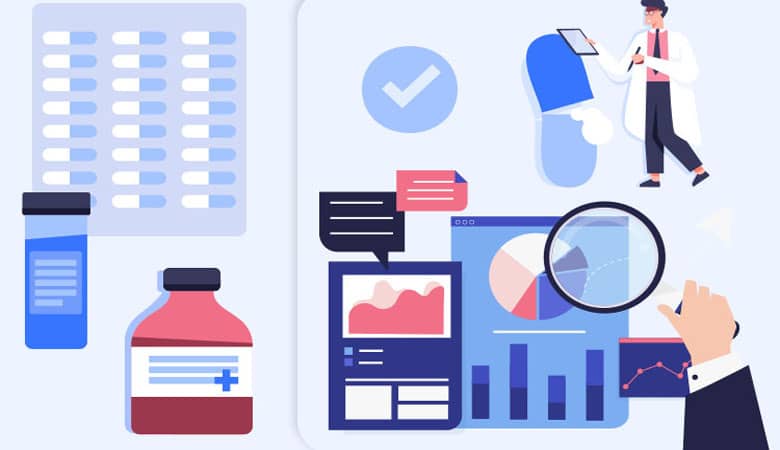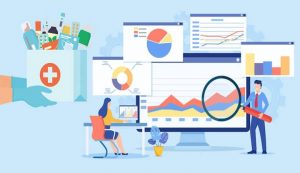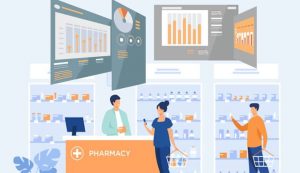Importance of Data Integration and Visualization in the Pharma Industry

The ever-changing healthcare scenarios put tremendous pressure on the pharma industry on various fronts. To deal with the global pandemic, pharma companies underwent massive clinical research and development to produce an effective vaccine in a short period. These uncertain scenarios assess and confirm how evolved pharma industries and their data integration and visualization strategies have.
Data plays a crucial role in the pharma and healthcare segment in new drug development, optimizing patient recruitment, a better understanding of various therapeutics, improving patients’ outcomes, handling pricing and performance pressure from stakeholders, and many more. Data integration strategies, technology, and analytics helps leverage the data in a meaningful way and drives informed and real-time decision-making.

The Need for Data Integration and Analytics in Pharma Industry
Today, pharma and drug manufacturers have access to vast data from different healthcare ecosystems, like electronic health records (EHR), research project results, preclinical to late-stage clinical trial data, post-marketing studies, and insurance companies.
Transforming this vast data into information/insight requires a proper data integration and visualization strategy. And pharma companies need to combine, analyze, and interpret these big data available in discrete formats to generate actionable information.
Proper data integration enables these data sets to get analyzed multiple times to achieve different goals such as producing effective medicines, enhancing manufacturing efficiencies, optimizing clinical trials, etc. We can access the data from a central location using tools like ML, AI, and natural language processing (NLP) for autonomous decision-making and response.
From a business perspective, pharma companies need to accelerate the process of cost-effective drug development. And it is possible by leveraging the data sources and rapidly identifying drug candidates that can provide real-world performance. Therefore, data integration during drug discovery and development with post-approval results and patients record is essential. Analytics helps pharma companies advise physicians how a particular medicine would fit within an individual’s treatment plan.
How Data Integration, Visualization, and its Application is Evolving the Pharma Sector
Data integration helps remove the existing data silos in an organization and improves interoperability and data sharing among stakeholders. Data integration accompanied by analytics and technology improves data visualization and actionable insight.
The AI, ML, and NLP technology applications in analytics help process the vast amount of data quickly and efficiently and easily identify any pattern.
The pharma industry is evolving through data integration and visualization in the following ways.
Accelerates Drug Formulation Process
The pharma companies leverage data integration and analysis to accelerate their drug development process. Predictive analytics helps identify and select therapeutic molecules with the potential to treat certain illnesses. Predictive models consider different data points about each target, how a target behaves when interacting with other proteins, target behavior in previous experiments, types of drugs that did or did not work before, and other historical information. It helps researchers find better treatments for the disease and accelerates the process.
Speed-Up Clinical Trials
Data integration and predictive analytics help leverage patients’ data. It identifies which specific patient population would fit the type of clinical trial and ensures those who suit will remain till the last stage of the clinical trial. It reduces the number of tests needed for research purposes and generates more effective results. The wastage of resources reduces, and the time to market developed drugs shortens.
Integration of Supply-Chain
The data generated from IoT devices and integrated help control the temperature across the supply chain. RFID with electronics product code technology aids electronic tracking, tracing, and authentication of pharmaceuticals to ensure the integrity of the supply chain and detect counterfeit drugs.
Predictive analytics analyze the vast amount of weather data and predict seasonal variations and associated conditions such as fever. It triggers a ramp in manufacturing and inventory control.
Drug Distribution and Sales
Advanced ML algorithms and predictive analytics models assist pharma companies in accurately forecasting drug sales. It allows an efficient distribution process through improved inventory management, reducing the risk of overstocking and drug crises.
Integration of these mathematical models and historical data points, such as past sales trends across regions, different customer segments, etc., contributes to future sales forecasts. Predictive analytics can identify and prioritize new sales opportunities by identifying profitable customer segments for a particular drug or medication. Organizations can focus on these areas for a better ROI.
Customer Relationship Management
Advertising and Marketing have become crucial even for pharmaceutical firms. They need to rely heavily on predictive analytics from the early drug development stage and each stage of its life cycle.
Predictive modeling and advanced analytics tracks how customers interact with various aspects of business operations throughout each phase of the sales process. It gives insight to companies for managing their customer relationships and marketing their product efficiently.

Data and Analytics Together Brings New Opportunities to Pharmaceutical Companies
Data and analytics together trigger change and open new avenues for pharma companies. DefineRight (DR), with its business analytics service, helps organizations leverage data integration, analytics, AI, ML, NLP, and other high-end technologies to integrate, process, and analyze data to get insight for decision-making. As a business enablement service provider, DR supports pharma and other organizations to optimize their business operations. The customized analytics service brings relevant and in-depth data insight to improve their operations, support innovation, and have positive ROI.




